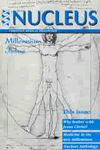Truth
The truth about life, the universe and everything
Non-Christian medical students will most often ask questions such as, ‘aren’t all religions the same?’ or ‘why does God allow suffering?’ They will hardly ever (and never in my experience) ask the most essential question of all, ‘is Christianity true?’ Satan has done a great job of removing questions of truth and falsehood from the agenda and Christianity has suffered much because of it.
Many Christians have also gone some way down this path ending up almost in a relativist position, where no absolute truth exists. You can see it when people present Christianity in terms of what it can do for you or how it will help you. Yes, the gospel does do these things, but it does them for the very simple reason that it is the truth about life, the universe and everything. Jesus declared ‘I am. . . the truth’ (Jn 14:6) and it is the immense importance of this claim and its implications that 20th Century Christians have to recapture. (Paul J. Just Looking at the Truth. Nucleus 1993; 22-25, April).
The illogicality of relativism
How many times have you heard the phrase: ‘Well, that may be true for you, but not for me’, and been stumped as to what to say next? If you think about it, it really doesn’t make sense. If the claims made in the Bible are true, they are true for everybody. (Houlberg H. The Gospel in a Pluralist Society. Nucleus 1993; 26-27, April).
The truth matters
I didn’t want to believe. There have been painful consequences for my believing. But what we want or don’t want has nothing to do with it. The point is this: is Christianity true or false? (Dionysius Dialogues. Nucleus 1996;28-32, April)
Is the gospel really an intrusion?
Christians know that medicine provides only part of humanity’s needs. We have been created both spiritual and physical, needing both types of therapy to be truly healthy. Unfortunately, the gospel is often seen as an unwelcome intrusion in a world where personal choice is the popular cry. We cannot accept this, for we serve a God of absolute truth who will judge the living and the dead (Pickering M. Editorial. Nucleus 1998; 1, July).
The truth finds us - not the other way round
Ultimately the reason people choose to be unbelievers is not because of a lack of evidence for God’s existence. Rather they suppress the truth that is self-evident because of sin (Rom 1:18). Faith is not a substitute for conclusive evidence. It is submission to the reality of who God is. We know God the person, not god the scientific deduction, for no one can point to a box and say ‘look I’ve found God’. God finds us. This is our sure foundation not our feeble attempt to find him (May J. Science and Religion Nucleus 1995; 2-8, April).
Christianity is the truth or nothing
Christianity is nothing if it is not a truth for everybody, and if it is that, then it must be the underlying motivation behind everything we think and do (May J. Science and Religion Nucleus 1995; 2-8, April).
The Bible
The authority of Scripture
Scriptural authority is objective not subjective. It doesn’t mean different things for different Christians. We can’t say that this text means one thing for me, and quite another for you. That’s relativism, the Devil’s lie (Gn 3:5). The Bible’s author, not its reader, determines the meaning (Dionysius Dialogues. Nucleus 1997; 32-37, January).
The Bible speaks today
God’s Word endures forever (Mt 24:35) He speaks just as freshly through it today as he did when it was first recorded. This is why the New Testament often records Old Testament revelation in the present tense: the Father says, (Heb 1:6,7,8,10) Christ says, (Heb 2:12,13) the Spirit says (Heb 3:7; 10:15). God’s word is living and active (Heb 4:12). For Jesus, if it was ‘written’, it was eternally true (Mt 4:4,7,10) (Dionysius Dialogues. Nucleus 1996; 33-37, October).
Interpreting the Bible
Scripture needs to be understood in its historical context. Some commands in Scripture apply only to certain individuals and groups; and a text without a context can be a pretext. If we remember where the text comes in the course of God’s revelation, and take care to balance scripture with scripture we are unlikely to go wrong (Dionysius Dialogues. Nucleus 1997; 32-37, January).































